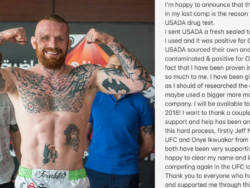The trouble with Ostarine: Jimmy Wallhead’s
16th March 2018
Features


Russian race walkers have appealed to Russian President Vladimir Putin to ‘restore the good name’ of coach Viktor Chegin (виктор Чёгин) after he was banned for life by the Russian athletics federation (RusAF) on 26 March. Chegin (pictured) gave his name to the Olympic training centre of the Republic of Mordovia in race walking, which is understood to have been disbanded in February.
The extraordinary letter, signed by 55 coaches and athletes, asks President Putin to ‘restore the constitutional right to work’ both for Mordovian race walkers and for Chegin. It says that the decision to ban Chegin and to disband the Saransk race-walking centre are ‘subjective in nature with political overtones’. It says that a Russian Anti-Doping Agency (RUSADA) hearing on 18 March found that there was no ‘direct evidence’ that Chegin had promoted the use of prohibited substances, or provided them to athletes.
It argues that the centre should be allowed to continue its work to support Sergey Kirdyapkin, Sergey Baulkin and Olga Kaniskina, who have recently returned from bans to find that they face several years practicing without a team, followed by a ban on their ‘great mentor’ Chegin. The letter is signed by all three athletes plus Elena Lashmanova, who was banned for doping following her victory in the 20km race walk at the London 2012 Olympics Games and Denis Nizhegorodov, former world record holder in the 50km race walk, amongst others. The five mentioned athletes were all coached by Chegin at some point in their career.
Over 20 athletes trained by Chegin are understood to have been disqualified for doping offences between 2005 and 2015. RUSADA provisionally suspended Chegin on 25 August 2014, after he was implicated in a doping case, however it did not launch an investigation until 15 July 2015, almost a year later. He was sacked as Russia’s race-walking coach by the Russian athletics federation (RusAF) a day later, when he was de-listed as Head Coach at the Saransk race walking centre.
Chegin was spotted coaching athletes at the 2014 European Athletics Championships in Zurich in August 2014, whilst provisionally suspended by RUSADA. Several of Chegin’s suspended athletes – including Baulkin, Lashmanova and Ekaterina Medvedeva – were spotted (here and here) competing at the Mordovian race walking championships in December 2014. RusAF attempted to claim that the photos were from a 2012 event, however detective work by Canadian race walker Evan Dunfee uncovered that the shoes and uniforms worn in the photos were not available in 2012.
The International Association of Athletics Federations (IAAF) told the Sports Integrity Initiative at the time that it was investigating the allegations, however it is not known if this has been followed up. The Court of Arbitration for Sport (CAS) recently upheld an IAAF appeal against the ‘selective’ disqualification of some of Chegin’s walkers, which has allowed them to keep their medals. As the written decision is not yet available, it is not yet known whether the CAS explored whether some of the walkers had competed whilst banned. In November 2015, the IAAF recommended that Chegin be banned for life.
“I’ve already talked with the initiator of the letter, and with Olga Kaniskina”, Russia’s Minister for Sport, Vitaly Mutko, told website Sport Express. “Athletes have been pushed to make the appropriate signatures. But this cannot be tolerated anymore. I explained this to the guys, and I hope they hear me and understand. Such treatment is incorrect […] when athletes turn to the head of state to objectively examine a disciplinary case. After the judgment of RUSADA, which is an independent organisation, nobody can intervene here – neither you, nor I, nor the State. If Viktor Chegin doesn’t agree, he has a right to appeal to the CAS.”
Mutko also revealed that Russia has not increased the amount spent on testing athletes, despite its agreement with UK Anti-Doping (UKAD) meaning that samples are checked in Britain. “We used to take 500 to 600 samples per month, now we take 100 to 200. But the facility is now using intelligence-led testing.”
Mutko said that he hoped working with UKAD would enable Russia to regain accreditation for RUSADA and for the Moscow laboratory. “Yes, we have hired foreign experts”, he said, perhaps prophetically, given this weekend’s news. “But where is the guarantee that the next day there will not be a new film or an article in the newspaper? What will we do then?”
• Eleven athletes (and a horse trainer) from eleven countries, competing in nine sports, were...
• 20 athletes from nine countries, competing in ten sports, were involved in anti-doping proceedings...
• Twenty four athletes from 13 countries, competing in eight sports, were involved in anti-doping...